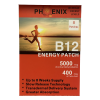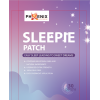Sleep aids, also known as sleep medications or sleeping pills, are drugs that help people fall asleep and stay asleep. They come in different forms such as tablets, capsules, liquids, patches, and sprays. Sleep aids work by targeting the central nervous system to slow down brain activity and promote relaxation.
There are two main types of sleep aids: prescription and over-the-counter (OTC). Prescription sleep aids include benzodiazepines, non-benzodiazepine sedatives and melatonin receptor agonists. These medications require a doctor's prescription and should only be taken under medical supervision. OTC sleep aids, on the other hand, can be purchased without a prescription but still have side effects that need to be considered before use.
However, one of the popular types of sleep aids today is Sleep Patches which aid in restful sleep without the need for liquid or pill intake. They are very simple and ready-to-use wearable patches anywhere and anytime. These patches are known to provide relaxation and improve the sleep cycle and sleeping time. Therefore many people use sleep pads as sleep aids because they struggle with insomnia or other sleep disorders that affect their quality of life.
Sleepie Patch: A Sleep Aid by Phoenix With 100% Natural Ingredients
This patch is brought to you by Phoenix Nutrition Inc. It supports you to fall asleep fast, stay asleep through the night, and wake up feeling refreshed! They are also a natural & safe way to enjoy good quality sleep every night. Improve all sleep stages and eliminate chronic fatigue. It is a type of transdermal vitamin patch that supplies ingredients through the skin and makes you fall asleep naturally. For more details check the product below.
Forms of Sleep Aids & Medications for Sleep Disorders
Sleep aids are products, medications, or techniques designed to help individuals fall asleep or stay asleep. These aids can be used to treat various sleep disorders such as insomnia. Here are a few different types of sleep aids:
- Over-the-Counter Sleep Aids: These are non-prescription medications typically used for short-term relief of mild insomnia. They usually contain antihistamines, which can make you feel drowsy
- Prescription Sleep Medications: For more severe or chronic sleep issues, doctors may prescribe medications like zolpidem (Ambien), eszopiclone (Lunesta), or other drugs in the benzodiazepine family
- Natural Supplements: Some people prefer natural sleep aids, such as melatonin or valerian root, which are believed to help promote sleep. However, these supplements should be used under a healthcare provider's guidance, as their safety and effectiveness can vary.
- Behavioral Techniques: Cognitive-behavioral therapy (CBT) can be an effective sleep aid. It involves working with a therapist to address thoughts and behaviors that are disrupting your sleep
- Sleep Hygiene Practices: This includes maintaining a regular sleep schedule, creating a comfortable sleep environment, and avoiding caffeine and screens before bedtime. These practices can greatly improve sleep quality
- Relaxation Techniques: Methods like progressive muscle relaxation, deep breathing, meditation, or yoga can help prepare your body and mind for sleep
- Sound Machines: Some people find that white noise or other soothing sounds can help them fall asleep and stay asleep
However remember, before starting any new medication or supplement, it's important to consult with a healthcare provider to discuss potential side effects and interactions with other treatments. Sleep aids can be very helpful, but they're typically meant to be part of a broader approach to improving sleep, which may include lifestyle changes and management of underlying health conditions.
How to find the right sleep aids for yourself?
Getting a good night's sleep is crucial for your overall health and well-being. Lack of proper sleep can affect your mood, energy levels, and cognitive function. If you're having trouble getting quality rest, you may be considering taking some form of sleep aid to help you drift off into dreamland. However, with so many options available in the market, finding the right one for yourself can be overwhelming.
The first step when looking for a sleep aid is to identify the cause of your sleeping problem. Is it stress, anxiety, or an underlying medical condition? Once you've identified the root cause, it will be easier to determine what type of sleep aid will work best for you. For example, if stress or anxiety is keeping you awake at night, then natural remedies such as chamomile tea or lavender oil may help soothe your nerves and enable better relaxation.
Also, there are several non-medication approaches to improving sleep that you can try before turning to sleep aids. These include practicing good sleep hygiene, establishing a regular sleep schedule, creating a relaxing bedtime routine, managing stress, and avoiding stimulants like caffeine close to bedtime. Consider trying relaxation techniques, such as meditation, deep breathing exercises, or yoga, to promote better sleep.
However, If lifestyle changes and non-medication strategies aren't sufficient, you may explore over-the-counter sleep aids. Common OTC options include antihistamines like diphenhydramine or doxylamine, which have sedative effects. However, it's important to read and follow the instructions carefully and be aware of potential side effects or interactions with other medications you may be taking.
Some important steps to find the right sleep aids for yourself may include:
- Understanding your sleep pattern
- Establishing healthy health habits
- Consulting a healthcare professional or a doctor
- Considering non-medication options
- Explore OTC sleep aids
- Taking Prescription Sleep aids
If you are searching for the right sleep aid, considering a natural sleep patch is advisable. But you have to do your own exercise and need to find the right type of medication required for you by visiting your doctor.
Conclusion:
Sleep aids are a type of drug and medication that help people fall asleep and stay asleep. They are commonly used to treat insomnia, a sleep disorder characterized by difficulty falling or staying asleep. Insomnia can have various causes, such as stress, anxiety, depression, and other medical conditions. Sleep aids medication can be either prescription or over-the-counter (OTC) drugs.
Prescription sleep aids medication includes benzodiazepines, nonbenzodiazepines, and melatonin receptor agonists. Benzodiazepines work by enhancing the effect of gamma-aminobutyric acid (GABA), a neurotransmitter that reduces brain activity and induces relaxation. Examples of benzodiazepine sleep aids include temazepam (Restoril) and triazolam (Halcion).

















